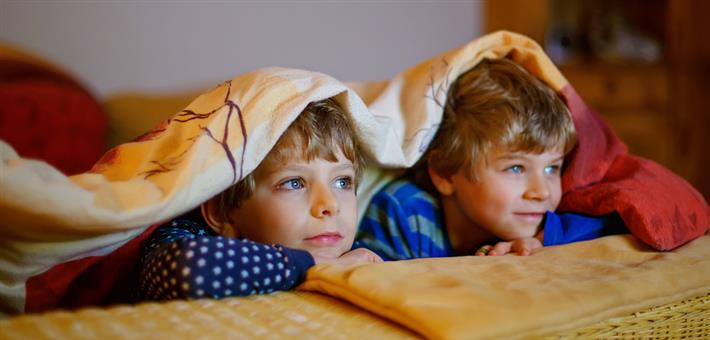
Are you sleeping? How Sneaky Media Use After Bedtime Relates to Preschoolers’ Sleep
Ever thought your preschooler was sound asleep, but when you went into their room to check on them, you found your child watching television in secret? A study in Health Communication shows that one third of parents has ever caught their child engaging in “sneaky media use”. This secret behavior is associated with shorter sleep duration.
Take aways
- Preschoolers who secretly watch TV when they actually have to sleep, sleep fewer hours per night.
- Parents should be aware that having a media device in their preschoolers’ bedroom considerably increases the chances of sneaky media use, and that this can be harmful.
Study information
The question?
How do preschoolers' (sneaky) media use relate to having media devices in the bedroom, and to night- and daytime sleep?
Who?
278 preschoolers (mean age = 4 years old; 52% girls; 62% White, 23% African American, 5.4% Asian, 2% Hispanic, 0.4% Native American, 0.4% Native Hawaiian, and 8.6% mixed race)
Where?
Michigan, United States
How?
Preschoolers’ parents and guardians completed a survey about their child’s sleeping behavior (bed times and wake up times, duration of nighttime sleep and daytime naps). Moreover, they reported the duration of preschoolers’ media use (television, DVD, game console, and computer use) and the number of media devices in the child’s bedroom. Finally, parents and guardians indicated the frequency of their child’s sneaky media use (how often they caught their child using media when he/she was supposed to be sleeping).
Facts and findings
Media use
- Preschoolers who used media more took longer daytime naps, but did not necessarily sleep shorter at night.
Media devices in the bedroom
- When preschoolers had media devices in their bedroom, this was most often a DVD player (23%), followed by a television (19%), and a video game console (9%).
- The presence of media devices in the preschoolers’ bedroom was not associated with sleep duration at night, nor during the day.
Sneaky media use
- A third of the preschoolers (33%) was at some point caught by their parents for sneaky media use when they actually had to sleep.
- When using media in secret, most preschoolers watched television (28%), followed by watching DVD’s and playing video games (both 9%), and using the computer (5%).
- Preschoolers with televisions in their bedroom were more than twice as likely to use media in secret than preschoolers who did not have a TV in their room.
- Sneaky media use was associated with shorter nightly sleep duration at night, but not for daytime naps.
- Critical note. From this study no conclusions can be drawn about cause and effect. Although it can be logically expected that media use affects preschoolers’ sleep (more so than the other way around), future research should test this assumption.